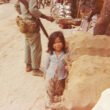In my 1950s East Harlem household, solidarity was akin to religion. In my family’s two-bedroom tenement, all were welcome, irrespective of race, ethnicity, religious belief, or sexual orientation. As a child, five-syllable words like solidarity were not in my vocabulary, but fairness and kindness were.
Although we were poor, my parents—both of whom were orphaned for parts of their childhoods—always found room in our two-bedroom walk-up for relatives and friends who needed a place to stay.
My dad was also a trade union activist in District 65, then a small scrappy union of wholesale and warehouse workers. In my childhood I took little interest in his work and unions as a whole, but later in life I realized how profoundly I was influenced by his teachings and his example.
I dropped out of college during my sophomore year. In November 1965, I received my “Greetings From Uncle Sam”—the actual wording of U.S. Army induction orders at the time.
I was drafted in December and assigned to a Fort Hood, Texas, signal battalion for basic training. In the spring of 1966, I began my advanced training as a signal unit switchboard operator at Fort Gordon, outside Augusta, Georgia. There I joined a study group of seven GIs who had questions about our nation’s involvement in Vietnam and Southeast Asia.
I needed justification for taking up arms against a nation of farmers and peasants 10,000 miles from our shores. The training films we were forced to watch in basic offended more than informed. I also found offensive the derogatory terms applied to the Vietnamese people and others from Southeast Asia.
Two of the members of the Fort Gordon study group had been political activists. They provided most of the reading material. They also arranged meetings with local anti-war groups and members of the Student Nonviolent Coordinating Committee, an early opponent of the war and led at the time by Stokely Carmichael.
Reading the literature, especially from SNCC, taught me that as a Black American, my battleground was at home, not in Southeast Asia. I also learned that Black soldiers were disproportionately assigned to the infantry and were dying at a rate far above our percentage in the country.
I read that Ho Chin Minh, the revered leader of Vietnam’s anti-colonial independence movement, lived in Harlem in the 1920s and wrote a pamphlet denouncing the lynching of Black Americans. This helped to endear me to Uncle Ho, as he was affectionately called, and to the plight of the Vietnamese people who had fought for decades for the right to self-determination.
During the summer of 1966, I and two other members of the study group, Dennis Mora and David Samas, announced that we would not comply with our orders to serve in Vietnam. “We refuse to take part in an illegal, immoral and unjust war,” our joint statement read.
The support of our families, friends, and the growing anti-war movement helped us stand our ground and sustained us during our 28 months in prison. The growth of the opposition outside and within the military convinced us that making our opposition public had helped to build the movement.
I took special pride in heavyweight champion Muhammad Ali’s refusal to step forward for induction and his contention, “I will not go 10,000 miles to help kill innocent Brown people.”
Weeks earlier, Dr. Martin Luther King Jr. had delivered his “Beyond Vietnam” address at Riverside Church, in which he called for an end to the war and a “radical revolution of values.” He also said that the United States was “the greatest purveyor of violence in the world today.”
The corporate media and even organizations like the NAACP condemned him, arguing that Dr. King should not link disparate issues—war and civil rights. In his “Where Do We Go From Here?” speech in Atlanta later that year, Dr. King said, “We must see now that the evils of racism, exploitation, and militarism are all tied together. And you can’t get rid of one without getting rid of the other.”
Dr. King connected the dots. The problem was systemic. Years later, I would better understand the connections. I became a labor journalist because I wanted to help other working people connect the dots and see the intersection of the evils.
A clearer understanding of our common cause, I felt, would knock down walls, build bridges, and move us closer to a more equal and humane society. We’ve alternately taken some steps forward and backward. A major setback has been the decline of the labor movement, although the stirrings in recent years are encouraging.
Today, we have entered the darkest period in my lifetime. Far-right authoritarianism (some call it fascism) has arrived on the heels of a racist campaign of otherism. Our nation is now controlled by an oligarchy headed by the world’s richest man—a child of apartheid South Africa.
The current president is not the first to stoke racism and xenophobia, but he has taken it the furthest in generations. A nation founded on the exclusion and removal of its Indigenous people and erected on the backs of enslaved Africans helped write the book on racism and othering.
The guardians of our nation’s vaunted exceptionalism would have us believe that our borders and way of life are threatened by immigrants of color. Like immigrants of earlier generations, they are simply seeking a better life for themselves and their children. Many have fled to escape governments and conditions for which U.S. administrations are responsible.
“We are here because you were there,” say immigrants when questioned about why they left their place of birth.
The process of othering is not just about who gets to be defined as the true or real American. And it’s not simply about race. It’s about tightening the grip of the corporate class and billionaires. As Dr. King stressed, our fight is against the triple evils of racism, economic exploitation, and militarism. One can’t be fully addressed without addressing the others.
To keep the world safe for multinational corporations, the United States commands roughly 800 military bases in some 80 countries around the world. That enormous military presence also enriches the military industrial complex that the late Republican President Dwight Eisenhower warned our nation about in his 1961 farewell address.
Militarism together with the climate catastrophe are the chief factors that have moved the Bulletin of Atomic Scientists’ Doomsday Clock to 89 seconds before midnight, indicating how close we are to destroying the world.
A bedfellow of today’s militarism is Christian nationalism. The New York Times reported that Speaker of the House Mike Johnson, a Louisiana Republican, is the first Christian nationalist to hold that post.
Many Christian nationalists are Christian Zionists, who believe the restoration of Jewish people to Israel is a prerequisite for the second coming of Christ. That helps to explain the absence of sufficient outrage over the genocide of Palestinians in Gaza.
The Red Scare of the last century has been replaced by the war on terrorism. Today Muslims, Arabs, and Palestinians are the main targets. Also in the crosshairs are immigrants of color, especially students who oppose the policies of the Israeli administration.
The Trump administration has invoked the Alien Enemies Act to harass, silence, and kidnap immigrant students and workers. In April, the Supreme Court lifted a restraining order that had prevented mass deportations. Justice Sonia Sotomayor dissented, saying that “not only non-citizens could be taken off the streets, forced into planes and confined to foreign prisons with no opportunity for redress if judicial review is denied unlawfully before removal.”
The United States has been a flawed democracy from its inception. But today we are threatened with the loss of our remaining rights.
Our only choice is to fight back—including us seniors—by forming alliances and coalitions that are even broader and deeper than those that helped to end the war against the Vietnamese people. In this fight back, while respecting differences, there is no them or other, only us.
JJ Johnson is one of the Fort Hood 3, who in 1966 were the first U.S. soldiers to publicly refuse to serve in Vietnam. He is a retired labor journalist.




0 Comments